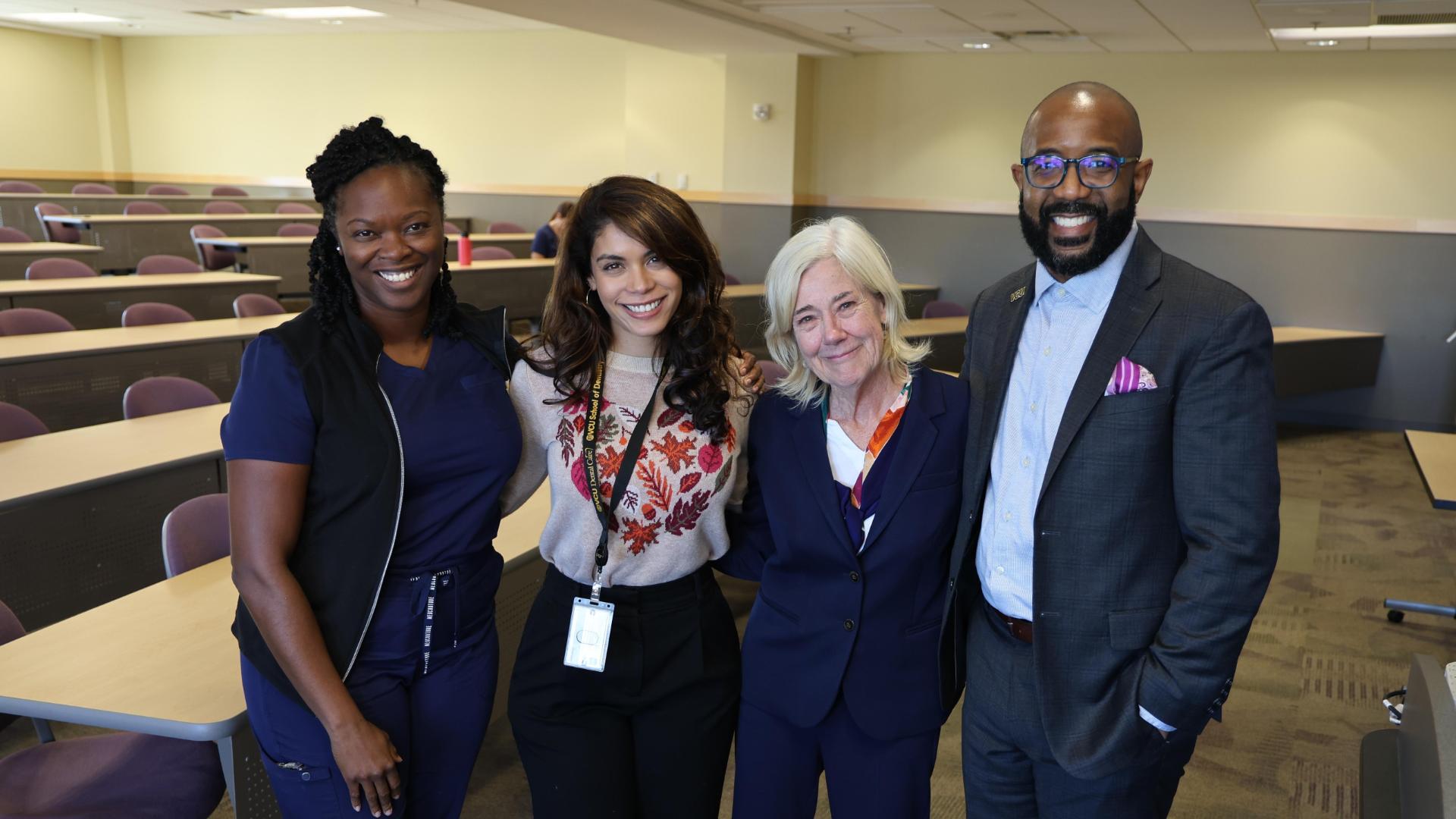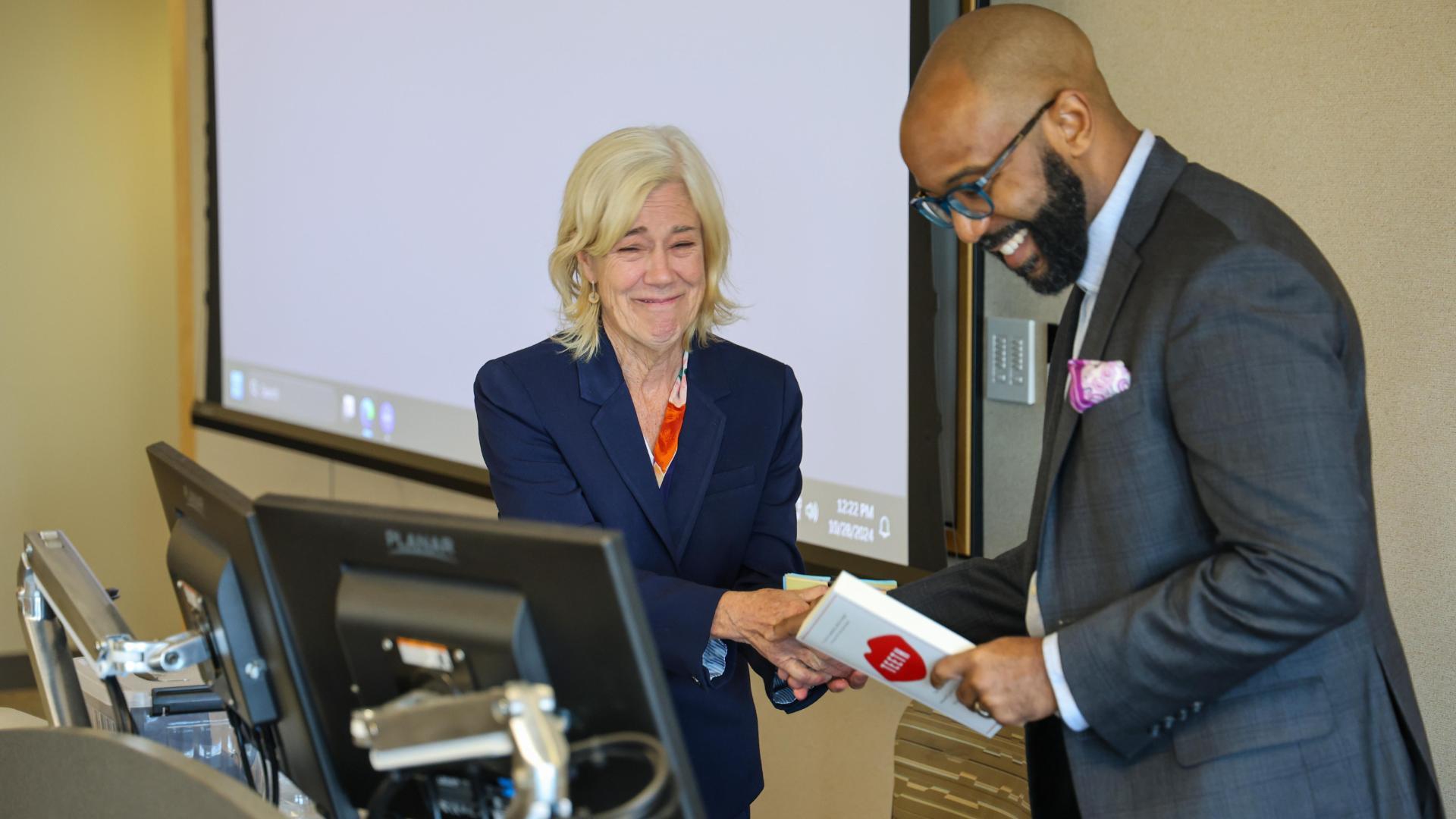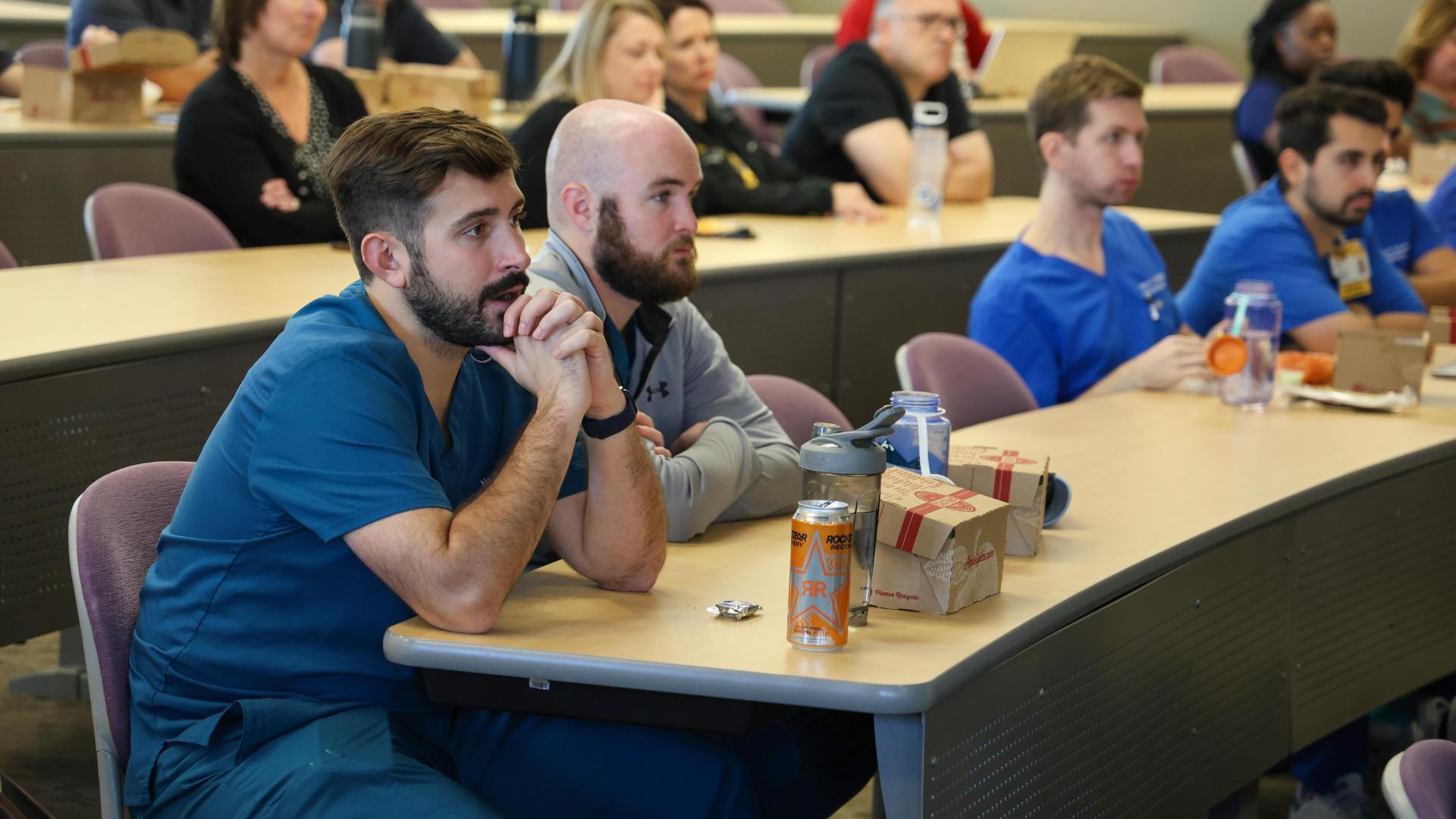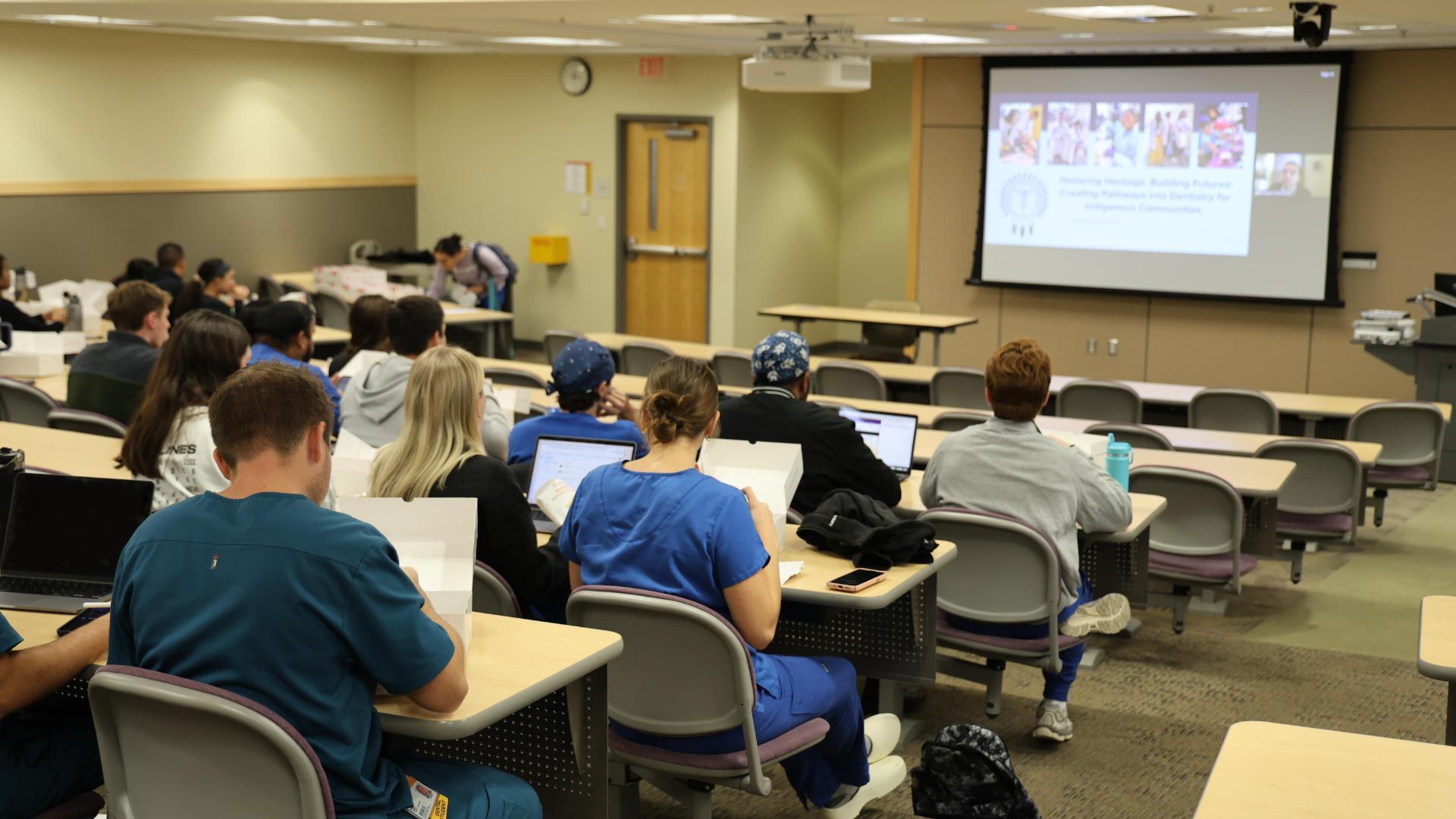
VCU School of Dentistry celebrates fifth annual Inclusive Excellence Week
VCU School of Dentistry celebrated its fifth annual Inclusive Excellence Week from October 28 to November 1. The week of lunch and learns, events and advocacy was hosted by the Office of Inclusive Excellence, Ethics and Community Engagement.
It was a time of celebrating the dental community’s diversity and commitment to inclusion as well as improving access to care for all in Virginia and beyond. Students, faculty and staff joined together to discuss important issues such as discrimination, geriatric dental care and oral health equity.
Carlos Smith, D.D.S., M.Div, associate dean of Inclusive Excellence, Ethics and Community Engagement, served as moderator of the lunch and learn events. He sought to find guest speakers that could offer unique perspectives on a wide range of topics. The theme for this year was health equity.
“Our commitments to ethical and professional duty compel us to, at a bare minimum, engage the concepts and practices of health equity,” Smith said. “While formal definitions vary, most scholars and clinicians agree, health equity is the idea that everyone should have a fair and just opportunity to be as healthy as possible, regardless of factors that can affect access to care and health outcomes. A key aspect of our obligations as health professionals is to aid in the mitigation and removal of obstacles to health and their consequences. We wanted to shed light this year on ways to do just that.”
The annual Inclusive Excellence Week began in 2020, as a completely virtual event, as the country and the entire globe continued to grapple with the effects of the COVID-19 pandemic and issues of public health, health disparities and health inequities.
Dr. Smith began the week as a means to address such pressing health issues. Topics over the years have included disability justice, care of LGBTQIA+ patients, workplace discrimination, trauma-informed care, Latino oral health disparities and even highlighting the long history of the School of Dentistry’s partnership with Kuwait.

Ruth Bravo-Anez, program coordinator for the Office of Inclusive Excellence, Ethics and Community Engagement organized the lunch and learn events alongside Smith.
“Inclusive Excellence Week offers an opportunity for students, faculty, and staff to come together during lunch to learn, reflect and engage in meaningful conversations about equity, inclusion, and advocacy in the dental profession. This initiative helps us explore ways to better serve our communities,” Bravo-Anez said.
“Educating our community on the importance of understanding each other not only creates better oral health professionals, but can make a life changing difference for our patients,” said Lyndon Cooper, D.D.S., Ph.D., dean of VCU School of Dentistry. “Inclusive Excellence Week serves as an annual reminder of our commitment to inclusion and community. I would like to thank all of our speakers who shared their insights and to all of the students, faculty and staff that took the time to listen. Our school will continue to lead the initiative to create a more inclusive dental community for all.”
Mary Otto, “Advancing Oral Health Equity - America’s Not So Silent Crisis”
The week kicked off with an in-person discussion with Mary Otto, journalist and author of “Teeth: The Story of Beauty, Inequality and the Struggle for Oral Health in America". The book was included as required reading in the orientation curriculum for current first year students.
“Teeth” is based on Otto’s reports about the struggle many Americans face to receive oral healthcare, which she described as “a silent epidemic in America that affects poor, racial and ethnic minority groups disproportionately”. The book finds its roots in the story of the tragic passing of Deamonte Driver due to complications from tooth decay. Otto initially reported on Driver’s story in 2007 as a reporter for the Washington Post.
Otto further explores how oral health impacts all aspects of life, from finding jobs, education, social interactions to overall physical health beyond the mouth.
“It was such a joy to not only learn that the students had read my book but that it had been useful in their education,” Otto said.
Otto visited VCU School of Dentistry from Washington, D.C., and she led a lunchtime discussion about the book followed by a “fireside chat” later in the day. The events were attended by students, faculty and staff who had read “Teeth” and participated in a Q&A session with Otto.
“Having an event like Inclusive Excellence Week is so wonderful and valuable for students and patients alike,” said Otto. “I enjoyed hearing the students’ questions. It is reassuring to know how much the next generation of providers cares and wants to address these issues.”
“It was such a delight to kick off our week with Otto,” Smith said. “Her work chronicling not only issues of access to care, but even the history of the separation of dentistry from medicine, are as relevant today as they were nearly two centuries ago when the first college dentistry was founded. We must move beyond the status quo and journey towards cultivating true oral health equity for all.”
“It was an honor to meet Mary Otto in person and hear her share her stories, as well as her valuable insights on the challenges of accessing oral health from her perspective as a journalist,” Bravo-Anez said.

Teague Rutherford, D.M.D.: Elevating the Voices of Indigenous People in Dentistry
“Our perspective includes the belief that no one can be as uniquely qualified to treat our people as we are.” - Society of American Indian Dentists
Teague Rutherford, D.M.D., led a discussion about the importance of Native Americans in dentistry. Rutherford grew up on the Fort Belknap reservation in Montana, where he saw firsthand the lack of accessible healthcare available to Native Americans. Inspired by a desire to help his people, he graduated from dental school and joined the Society of American Indian Dentists.
Rutherford discussed the importance of diversity in the dental profession, overcoming adversity and the importance of understanding and respecting the culture of different patients. He also addressed the issues of data genocide with Native American dental patients and the higher rates of early childhood caries for native children.
“We’re seeing more tribes taking over their healthcare systems, which means they have more control over the services and resources,” Rutherford said.
Briona Phillips, Ph.D., MSW, MPH: Combatting Discrimination
Briona Phillips, Ph.D., MSW, MPH, led a discussion detailing how discrimination impacts access to care for Black adults. Her research focused on the city of Baltimore, where she also lives.
Phillips received her Ph.D. from VCU and is a public health researcher and social worker. The objectives of her presentation were to recognize, understand and discover the impacts of discrimination among Black adults, particularly in how it pertains to receiving dental care.
Among other ideas, Phillips introduced the Black Butterfly concept. This is when there are concentrated areas of medical disadvantages for Black individuals. Barriers to healthcare, whether it be due to discrimination, location or cost, create significant problems for entire communities’ overall wellbeing and health. Dental care in particular is challenging for underprivileged communities to receive, and the longer that they go without care, oral health problems can lead to more severe illnesses.
“One of the fascinating things about Dr. Phillips’ work is the way in which she is problematizing the issue of access to care, particularly the notion that patient’s seeking dental care at emergency rooms may in fact, be making a deliberate choice to avoid dental offices because of their prior discriminatory experiences with them,” Smith said. “Larger health systems have been unapologetic in their efforts to address bias in the delivery of healthcare; her work may be a great catalyst for dentistry and oral health, on a large scale, to do the same.”
An Nguyen, D.D.S., MPH: Making Inclusion and Exceptional the Norm
An Nguyen. D.D.S., MPH, currently serves as Chief Dental Officer at Clinica Family Health, a large federally qualified health center and a nationally recognized leader in health quality and health equity. She spoke to students at VCU School of Dentistry about the importance of identity and belonging in the world of healthcare.
Nguyen shared her experience as a child of Vietnamese refugees and learning English as a second language. Her life experiences taught her the importance of inclusion and belonging.
According to Nguyen, it is the differences in backgrounds and identities that make a community stronger. In the medical field, it is important to continue to open doors and create an inclusive workforce.
“When I operate with an appreciation for who I am, I can build bridges and make connections,” Nguyen said. “I can further include people in the spaces I’m in.”
Christina Hogue, D.D.S., AGSF: Advancing Health Equity in Geriatric Dental Care
To close out the week, Christina Hogue, D.D.S., AGSF, led a discussion about the importance of identifying oral health disparities in geriatric patients. Geriatric patients face struggles such as limited mobility, physical and cognitive impairments and lack of specialized dental care. Many dental students never learn about specialized care for geriatric patients and many private practices lack equipment to accommodate them.
“Oral health is the silent epidemic,” Hogue said during her presentation, “It is the most common unmet health need, especially for this population.”
Hogue introduced two important ideas: cultural competence and doorway thoughts. To have cultural competence, oral health practitioners must value diversity and accept differences. Doorway thoughts come with self awareness; it is important as providers to not make assumptions and to treat patients without biases.
